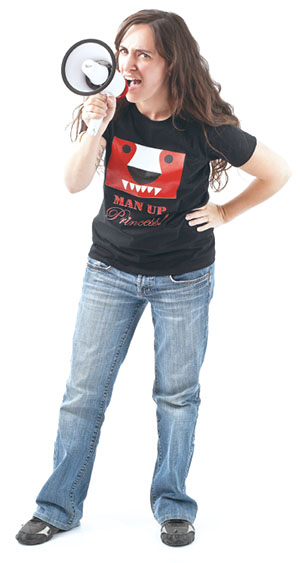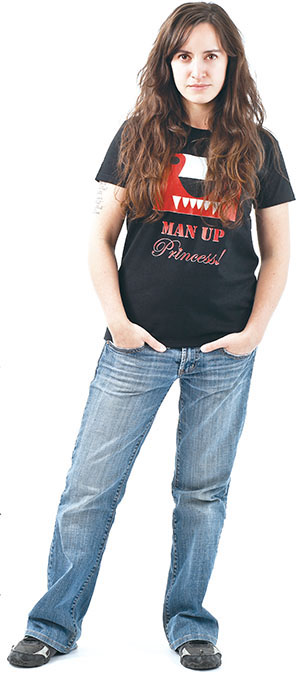The men’s rights movement arose in the 1970s largely as a reaction against feminism. Not surprisingly, most of the movement’s supporters are men. But that’s not true of an increasingly visible contingent, who make up a kind of subculture-within-a-subculture of their own: female men’s rights activists, or FeMRAs.
What brought you to the men’s rights movement?
I was very girl power for a long time. Growing up, I was always, “Girls can do whatever guys can do.” I would do hard labor jobs. I used to operate forklifts, machinery, things like that, working outside, getting dirty. I was never stereotypically feminine, never big on dresses and shoes and make-up and all that.
Jessica Kenney, 28, veterinary assistant, writer for the Honey Badger Brigade and manager of the Facebook page I Don’t Need Feminism. (Photo: Peter Foster)

One night the phrase anti-feminist popped into my head, so I started looking into it further. I wound up on YouTube, and found some videos. They framed reality and history in a way that I had never really considered. I found some Facebook pages and some A Voice for Men forums, and started chatting with people. When the Honey Badgers decided to put some radio shows and stuff together, [they] put out a bulletin saying if anyone is looking to work with us, to help us, shoot us an email. I did.
What about the movement inspired you?
The concept of male disposability most resonated with me. The idea that men go to war, and they’re just bodies to further a cause. There’s all of the outrage over sexism in video games, and feminists will pick all these different issues to address about how women are treated, but they never really touch on the issue that with all the killing that goes on, the majority of those characters who are getting killed are men. You can mow down fields of men, and nobody really bats an eye. But when a woman is wearing something revealing, everyone starts to freak out.
It always bothered me how in sitcoms and commercials and all the media, it always seemed like men bore the brunt of the joke. They were portrayed as bumbling oafs, foolish. They were their wife’s additional child who she had to take care of. They were lucky to have a beautiful woman in their life who could fix all their problems. I always thought, dear lord, if someone portrayed a woman like that, there’d be hell to pay.
What does that say about male power?
We really don’t acknowledge the power that women have. Women have a great deal of power in—I don’t want to use the word manipulation, because that sounds maniacal—but women have the ability to coerce, to get people to do things for them, as opposed to actually doing the actual acting.
So what’s your beef with feminism?
It seems like feminism tries to break things down really black and white, like male power, female subjugation, things like that. I think it’s a lot, lot more complicated…. I personally define feminism as a power grab, because the ideology itself advocates for more women in positions of overt power while ignoring the majority of men in positions of disempowerment. It advocates against inequality that benefits men while ignoring inequality that benefits women—if not exacerbating those inequalities.
Some people come up with these theories that all feminists all hate men, they’re trying to fight for their superiority. It really just seems that the things they’re arguing for just come from a position of misinformation, not intentionally trying to marginalize these issues. They just genuinely believe that women are at a disadvantage, and that women are primary victims, and things like that. They just haven’t seen the data that argues otherwise, that shows biases against men in things like intimate partner violence. They haven’t seen the numbers that show that men are actually three times as likely to be victims of violence, victims of homicide. There’s information out there that not everybody has seen that would be greatly beneficial to gender relations.
By combating feminism, do you want to kill it?
No. A lot of the people I work with are really more embracing of a position of egalitarianism. I’m definitely a big supporter of men’s rights, and I think that would be a sub-category of egalitarianism in general. I don’t deny that there are genuine women’s issues; I don’t want to marginalize anyone’s issues.
Yet both male and female men’s rights activists have gotten a lot of attention by harassing feminists, making rape jokes, and using other shock tactics. Do you stand by those?
I’m not going to agree with everyone within the movement. Personally, the way that I approach things is through very neutral positions…. The biggest reason for advocating for men’s issues specifically in this day and age is mostly because there’s so much attention focused on women’s issues that focusing on men’s issues will at least balance the picture. I would hope that once we start to balance things out, we could start to argue from a human position, and talk about human issues as opposed to men’s issues or women’s issues…. A lot of conversations with feminists tend to be “sure there are men’s issues, but what about women?” I think the more important way to talk about it is instead of using “but,” using “and.”
If I had to label it, I’d say that’s more of a moderate position in the movement. But I can’t speak for everyone.
Jessica Kenney, 28, veterinary assistant, writer for the Honey Badger Brigade and manager of the Facebook page I Don’t Need Feminism. (Photo: Peter Foster)

How do you actually go about advocating for men’s rights?
I’m mostly online talking about ideas…. Some of my favorite Google hangouts have included myself in the U.S., my friend John in the U.K., another friend in Northern Ireland, and another person in Australia. People come to us more than we reach out to them. On the I Don’t Need Feminism site I run, we’re at 8,200 supporters.
Do you encounter a lot of resistance?
I definitely get a lot more anger and awful stuff hurled at me from the feminism side. It seems to be fairly common that for a woman to comprehend the MRA movement’s ideals, you’ve got to be really thick-skinned.
People are only mean to me online, just the people who have never actually met me in person—you know, the keyboard warriors. They’ll call names and things like that. People have said I have Stockholm syndrome, that I’m a sex slave, a gender traitor—that’s my favorite.
Why is important for women, in particular, to join the movement?
When men are talking about their issues and their rights, it’s really easy for people to say, “They’re just angry and miserable and bitter.” But when women start talking about these things, a lot of time people start to listen.
—Jessica Kenney, 28, veterinary assistant and manager of the Facebook page I Don’t Need Feminism
For more on the science of society, and to support our work, sign up for our free email newsletters and subscribe to our bimonthly magazine. Digital editions are available in the App Store (iPad) and on Google Play (Android) and Zinio (Android, iPad, PC/MAC, iPhone, and Win8).




